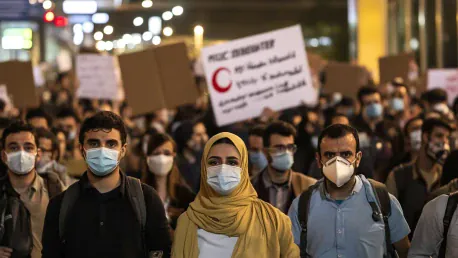Amid growing discontent with the Turkish healthcare system, a coalition of health workers has taken decisive action to protest against new regulations they argue prioritize profit over patient care. Beginning with a five-day work stoppage on January 6, these protests culminated in a general healthcare strike, driven by key organizations such as the Turkish Medical Association (TTB), the Union of Health and Social Service Workers (SES), and the Federation of Associations of Family Health Workers, Midwives, and Nurses.
New Regulations and Their Impact
Health workers’ primary grievance is a new regulation introducing financial penalties for staff and a performance evaluation system rooted in profitability. Dr. Emrah Kırımlı, part of TTB’s Family Physicians Branch, contends that these regulations diminish the true essence of healthcare. Doctors are reduced to performers of tasks aimed merely at financial gain, undermining the integrity of patient care. The regulation further sets stringent time limits on patient visits, requiring physicians to see at least 64 patients daily for a full salary, thereby compromising care quality and imposing financial burdens on patients with complex conditions.
The Ministry of Health’s Claims vs. Reality
Despite the Turkish Ministry of Health’s claims about expanding healthcare coverage, the reality paints a different picture. Primary healthcare, designed to be the system’s access point, is often sidestepped as patients opt for consultations at higher levels. The private sector’s involvement through outsourced services has led to devastating outcomes, exemplified by the tragic deaths of ten children due to unnecessary procedures at private hospitals.
Longstanding Resistance to Profit-Driven Policies
For years, health workers have resisted policies that prioritize revenue over patient well-being. Yet, policy trends have leaned toward commercialization, with reforms like capitation-based payments and outsourcing services facilitating this shift. These changes have driven a focus on health tourism and revenue-generating activities, significantly impacting the quality of patient care.
Consequences for Health Workers and Patients
The new regulations have had a severe impact on both health workers and patients, especially vulnerable groups like migrants. Health workers, particularly nurses and midwives at family health centers, are facing salary cuts of 20-30%, worsening their financial hardships. Dr. Kırımlı warns that if these changes persist, the already fragile primary care system will lose its capacity to address healthcare inequalities.
Protests and Calls for Reform
To avert further deterioration of Turkey’s healthcare system, protesting health workers are calling for several key measures. These include reducing the number of patients per physician, improving physical infrastructure, reallocating budgets to bolster primary care, raising salaries for primary healthcare workers, and expanding the workforce to include social workers, psychologists, dietitians, and physiotherapists. Without these changes, Turkey risks a mass emigration of healthcare workers, leading to limited patient access to care and increased financial burdens.
Looking Ahead
Facing increasing dissatisfaction with the Turkish healthcare system, a coalition of healthcare workers has taken a stand to protest against newly imposed regulations that they believe prioritize profit over patient care. This movement began with a five-day work stoppage commencing on January 6. The situation escalated into a widespread healthcare strike, fueled by major organizations like the Turkish Medical Association (TTB), the Union of Health and Social Service Workers (SES), and the Federation of Associations of Family Health Workers, Midwives, and Nurses. These groups argue that the new regulations undermine the quality of patient care by focusing on financial gain. The strike aims to draw attention to the pressing need for reforms that ensure patient welfare is the top priority. The healthcare workers are determined to highlight the detrimental impact of these regulations and advocate for changes that would enhance the overall healthcare system, ensuring it serves the best interests of patients rather than merely generating profit. Through their unified actions, they hope to initiate substantial and meaningful changes in Turkey’s healthcare policies.









